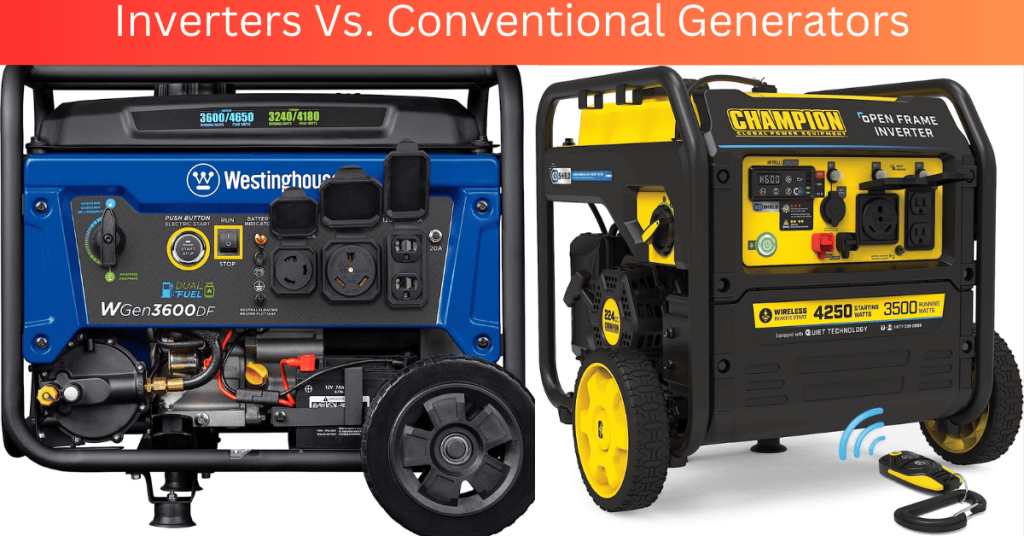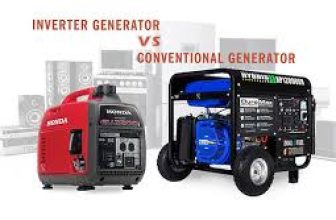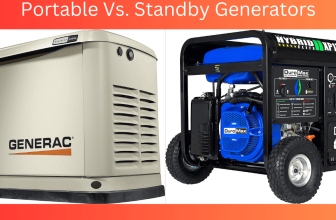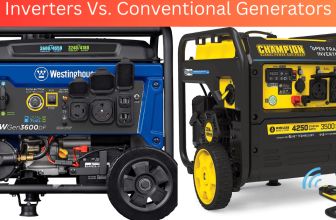Are you in the market for a generator but can’t decide between an inverter or conventional model? You’re not alone! Many people find it hard to choose the right type of generator for their needs, and it’s important to understand the differences between inverter and conventional generators.
In this article, we’ll explore the pros and cons of each type so you can make an informed decision. Let’s dive in!

What Is An Inverter Generator?
I’m sure you’ve heard of inverter generators, but do you know exactly what they are and how they differ from conventional generators? Let me explain.
An inverter generator is a type of portable generator that uses modern technology to produce cleaner and more reliable power. It’s designed with an internal alternator that produces alternating current (AC), which is then converted into a direct current (DC) signal.
This DC signal passes through an electronic control unit, where it is converted back into a stable AC output. The result is a smooth, steady stream of electricity that won’t damage sensitive electronics like computers, cell phones, and TVs.
Inverter generators are also quieter than conventional generators because they use advanced motor designs and sound-dampening technology to keep the noise level down. They come in smaller sizes as well, making them great for camping trips or tailgating events. Plus, many models are lightweight and have built-in handles so you can move them around easily.
So if you’re looking for a portable generator that can provide clean and reliable power without the noise or hassle of traditional models, then an inverter generator might be the perfect choice for you.
Next up, let’s take a look at what sets conventional generators apart from their inverter counterparts.
What Is A Conventional Generator?
Now that we know what an inverter generator is, let’s move on to conventional generators.
A conventional generator is a type of generator that is less expensive and more widely available. It has a simple design and uses a brushless alternator and an AC circuit breaker. Unlike an inverter generator, it does not have sophisticated electronics or advanced noise control technology. This means that it produces more noise than an inverter generator, making it much less suitable for use in residential areas or for camping trips.
Because of its simpler design, a conventional generator is usually easier to maintain than an inverter generator, which requires regular maintenance and servicing to keep running at peak performance levels. Conventional generators also tend to be more durable and reliable than inverter generators due to their lack of electronic components. However, they do require more fuel and are not as energy efficient as inverters, so they may be more costly to run in the long term.
Conventional generators are great for powering tools at construction sites or large events where portability isn’t essential. They provide reliable power when you need it without breaking the bank, but you should bear in mind their higher noise levels before deciding which type of generator is right for your needs.
Moving on from here, let’s take a look at how the two types compare when it comes to their noise levels.
Noise Level Comparison
When it comes to noise, you want an option that won’t drive you crazy. Conventional generators can be incredibly loud, while inverter generators are much quieter and more bearable. Let’s compare the two side-by-side and see how they measure up.
| Inverter Generator | Conventional Generator | |
|---|---|---|
| Noise Level | Quieter | Louder |
| Decibels (dB) | 50-60 dB at 7 meters distance | 70-90 dB at 7 meters distance |
Inverter generators are designed to keep noise levels low, so they’re ideal if you want to use your generator in residential or camping areas without disturbing others. They usually produce around 50-60 dB of sound at a distance of 7 meters – about the same as a normal conversation. On the other hand, conventional generators tend to be louder, typically generating between 70-90 dB at the same distance – comparable to the sound of a lawn mower running or a vacuum cleaner.
As you can see, inverter generators are much quieter than their conventional counterparts – perfect for those who don’t want to deal with constant loud sounds and would rather keep it peaceful. With this in mind, let’s move on and take a look at portability comparison between inverter and conventional generators.
Portability Comparison
When it comes to portability, there are some major differences between inverter generators and conventional generators. As a regular user of both types of generators, I can tell you that one of them definitely has an edge over the other. Let me explain.
Inverter generators are much more portable than conventional models because they weigh less and take up less space in your vehicle or storage area. They also have quieter running engines that produce less vibrations than traditional models, making them much easier to transport and move around. Plus, they have a smaller fuel tank so you don’t have to worry about lugging around a heavy gas canister while you’re on the go.
On the other hand, conventional generators tend to be bigger, heavier and noisier than inverter models. They also require more fuel to run and generate more exhaust fumes which could be an issue if you plan on using your generator outdoors or in enclosed spaces.
So while they may not be as convenient as inverters when it comes to portability, they do offer more power for larger applications such as powering large appliances or running multiple items at once like air conditioners or pumps for water systems.
The choice between an inverter generator and a conventional one comes down to what your needs are when it comes to portability and power output. If you need something smaller and lighter that produces less noise then an inverter model is probably the way to go. But if you need more power then a conventional generator might be better suited for your needs.
With these considerations in mind, let’s now look at how these two types of generators compare when it comes to fuel efficiency.
Fuel Efficiency Comparison
It’s important to make sure that you’re getting the most out of your purchase when looking at either an inverter generator or a conventional generator. When it comes to fuel efficiency, the two types have their differences and similarities.
For starters, both are designed to be highly efficient with how they use fuel, but there are still some distinct differences between them. Inverter generators are powered by gasoline and run on a pulsed-power system that allows them to regulate their voltage output.
This means they can automatically adjust their power output depending on the load, which makes them much more fuel efficient than conventional generators. They also produce cleaner power which is great for sensitive electronics like computers and cell phones.
Conventional generators are powered by diesel or gasoline and require manual adjustment of the voltage output. This means they can’t automatically adjust their power output like an inverter generator does, making them slightly less fuel efficient than inverter generators in certain situations. However, many people prefer conventional generators due to their robustness and durability – something that inverter generators don’t always offer.
The key takeaway here is that when it comes to fuel efficiency, both types of generators have their advantages and disadvantages – so it’s important to consider your needs before making a decision about which one to buy.
Transitioning into the subsequent section about price comparison, let’s take a look at what you should consider when thinking about cost…
Price Comparison
Moving on from the fuel efficiency comparison, now let’s take a look at the price difference between inverter generators and conventional generators.
Generally speaking, inverter generators tend to be more expensive than conventional ones. This is largely due to the fact that they come with more features and advanced technology which can drive up their cost.
However, if you’re looking for something that fits your budget, there are still plenty of options available when it comes to inverter generators. Many of them boast features such as fuel-saving settings and quieter operation, allowing you to get great value for your money. On top of that, many models offer extended warranties so you can be sure your investment will last for years to come.
At the end of the day, it all comes down to what you need and what you can afford. If price isn’t an issue for you, then an inverter generator could be the perfect choice for your needs. But even if it is, there are still plenty of good options available at varying price points – so do your research before making a purchase.
Now let’s move on to comparing maintenance requirements between these two types of generators.
Maintenance Requirements Comparison
When it comes to maintenance, there are a few key differences between inverter generators and conventional generators. For starters, inverter generators require substantially less maintenance than conventional generators. That’s because they are designed with fewer moving parts and a more efficient cooling system, which means they have fewer components that would need regular servicing or replacement.
On the other hand, conventional generators require periodic oil changes and air filter replacements to keep them running smoothly for long periods of time. Inverter generators also tend to be quieter than conventional models since their engines operate at different speeds depending on the load. This makes them much easier to maintain without having to worry about loud noises from the engine when not in use.
Conventional generators can make a lot of noise when running, so regular maintenance is important to ensure that it runs smoothly and quietly. In addition, inverter generators are much more fuel-efficient than conventional models due to their unique design. This means that you won’t have to fill up as often, saving you time and money in the long run.
On top of that, they generally last longer since they don’t have as many parts that wear out over time like conventional models do. From a maintenance standpoint, this makes inverter generators an attractive choice for those who want reliable power without having to put in too much extra effort in upkeep.
Moving on, durability comparison is an important factor when selecting a generator for your needs.
Durability Comparison
As we have seen, the maintenance requirements for inverter and conventional generators differ greatly. Now let’s compare their durability.
When it comes to durability, inverter generators come out ahead in most cases. The manufacturers of these types of generators use high-quality components to create a product that is extremely reliable and lasts a long time.
Conventional generators, on the other hand, are not as durable as their modern counterparts. They tend to require more frequent maintenance and repairs over time due to their lower quality parts.
Inverter generators also tend to be quieter than conventional models, which makes them ideal for camping or recreational use where noise levels must be kept low. In addition, they are more fuel-efficient than conventional models, which can save you money in the long run.
Overall, inverter generators offer superior durability when compared with conventional models. When making your choice between the two, it is important to consider not only the initial cost but also how much you will be spending in the future on upkeep and repair costs. With proper care and maintenance, an inverter generator can provide years of reliable power for your home or business needs.
With this knowledge in mind, let’s move on to comparing power output between inverter and conventional generators.
Power Output Comparison
Let’s jump into the discussion of power output.
As you may already know, the main difference between inverter and conventional generators is the power output. Inverter generators can produce a much higher wattage than conventional generators. They are also capable of producing very clean and stable electricity that is ideal for running sensitive electronic devices such as computers, phones, and TVs.
Conventional generators have a lower wattage output and tend to produce more noise and vibration when running. To illustrate this difference in power output, let’s look at two examples. An inverter generator might be rated to produce 2,000 watts while a conventional generator might only be able to produce 1,000 watts. That means that the inverter generator can generate twice as much power as its conventional counterpart.
Additionally, inverter generators tend to be more fuel efficient and quieter than conventional generators due to their higher efficiency levels. Both types of generator have their advantages and disadvantages when it comes to power output so it’s important to consider all the variables before making your decision on which type of generator is right for you.
Which Type Of Generator Is Right For You?
I’m sure you’re here because you’re trying to figure out which type of generator is right for you. It’s an important decision and one that shouldn’t be taken lightly.
Inverter generators are great for those who need a portable and quiet generator. They’re smaller than conventional generators, making them easy to move around, and they produce much less noise than the traditional generators. They’re also more fuel efficient, requiring less gasoline for the same amount of power output. Additionally, inverter generators provide cleaner electricity with less voltage fluctuation than regular generators. The only downside is that they come at a higher price point than conventional ones.
Conventional generators are great if you’re looking for something more affordable or powerful enough to power large appliances such as air conditioners or refrigerators. They also don’t require quite as much maintenance as inverter generators do since they don’t have any electronic components. The downside is that they’re loud, bulky and use more fuel than inverter models – not to mention they produce more dangerous levels of electricity with greater voltage fluctuation.
At the end of the day, it all comes down to your individual needs and preferences when it comes to choosing between inverter vs conventional generators. Consider your budget, how often you’ll be using it and what size of a generator will best suit your needs before making a decision.
Frequently Asked Questions
What Type Of Fuel Do Inverter Generators Use?
Inverter generators are an increasingly popular option for those looking for a reliable power source.
Unlike conventional generators, inverter generators don’t use gasoline – instead, they run on cleaner-burning propane or natural gas.
Propane is often the preferred choice because it’s easier to store and transport, but if you’re looking for a more affordable option, natural gas could be the way to go.
Inverter generators are also quieter and more efficient than their conventional counterparts, making them well worth considering if you’re in the market for a generator.
Can Inverter Generators Be Used To Power Sensitive Electronics?
Sure, inverter generators can be used to power sensitive electronics. But it’s important to understand the benefits and drawbacks of using an inverter generator over a conventional one.
Inverter generators usually have the advantage when it comes to producing clean power, making them perfect for powering sensitive electronics that don’t respond well to fluctuations in voltage. However, they are typically more expensive than conventional generators and require a different type of fuel.
So it’s important to weigh your options carefully before deciding which type of generator is right for you.
How Many Outlets Does A Conventional Generator Have?
Do you need to power a range of tools and appliances?
If so, it’s important to consider how many outlets your generator should have.
Conventional generators usually have between two and four outlets, though some may have as many as six or more.
Keep in mind that if you’re looking for maximum versatility from your generator, multiple outlets are key!
That way, you can power several devices at once without having to unplug and re-plug them all the time.
Are Inverter Generators More Expensive To Maintain?
Maintaining an inverter generator isn’t necessarily more expensive than a conventional generator. The cost of upkeep depends on the size, age, and usage of either type of generator.
Inverter generators are typically smaller and more portable than conventional ones, so they may require less maintenance over time due to their design.
On the other hand, inverter generators are also usually more expensive to purchase in the first place. So depending on your needs and budget, you’ll have to decide which type is right for you.
What Is The Maximum Power Output Of An Inverter Generator?
Inverter generators are incredibly powerful pieces of machinery. They typically have a maximum power output of between 1,200 and 10,000 watts, depending on the size and model you choose.
This makes them perfect for most home needs and even some industrial projects. It’s important to note that larger models can be more expensive but will provide more overall power output.
Conclusion
In conclusion, it’s important to weigh the pros and cons of inverter generators versus conventional generators before making a purchase.
Inverter generators are great for camping trips or other recreational activities because they can easily power sensitive electronics and come with multiple outlets. While they may be more expensive upfront than conventional generators, their low maintenance costs help make up for that.
However, if you need higher wattage output, then a conventional generator may be the better option. All in all, both types of generator have their own unique benefits that should be taken into account when deciding which one is best for your needs. Westinghouse Outdoor Power Equipment 12500 Peak Watt Dual Fuel Home Backup Portable Generator, Remote Electric Start, Transfer Switch Ready, Gas and Propane Powered, CARB Compliant





